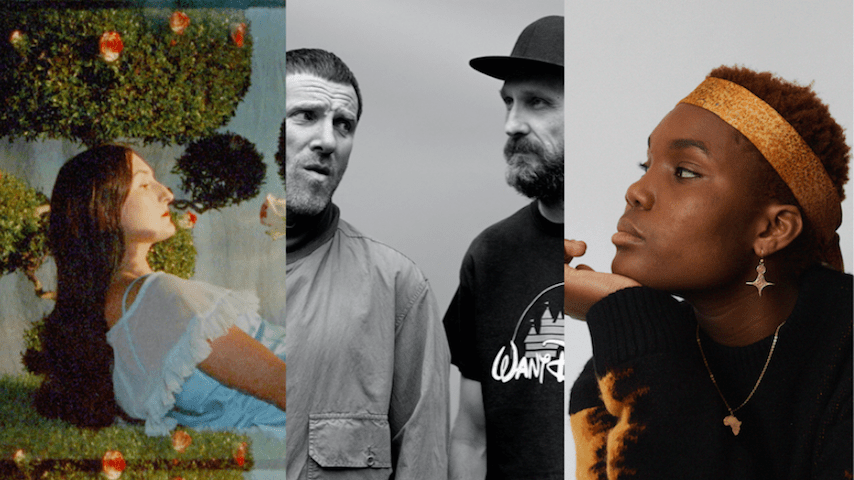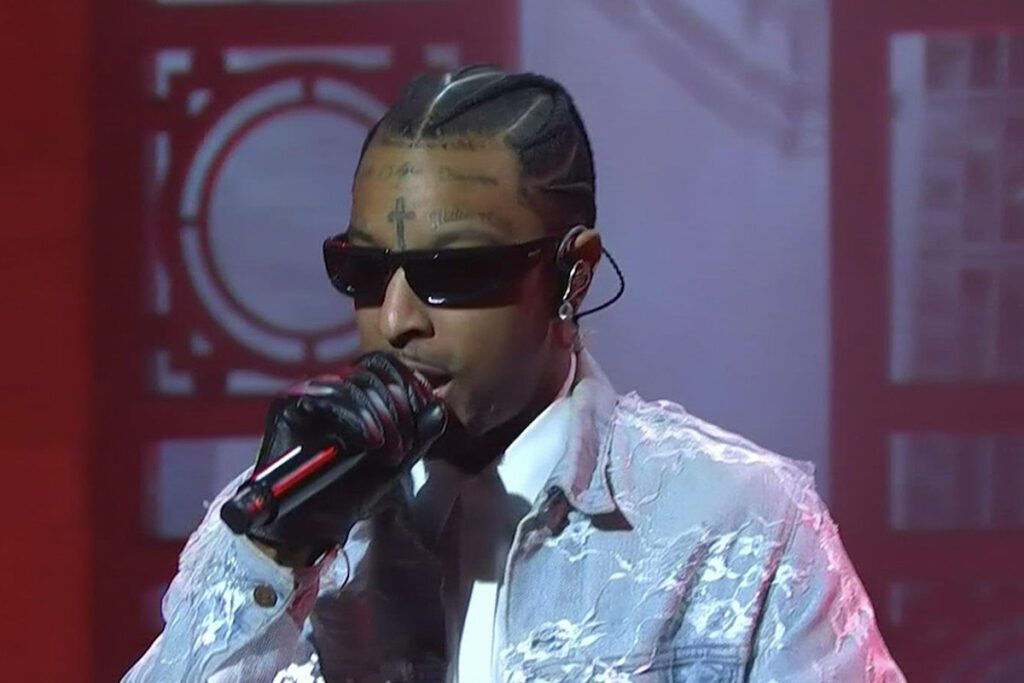The first month of the year is just about under our belts, which means we have a month’s worth of albums to mull over. This January, we’ve enjoyed a few albums from our list of most anticipated albums in 2021—Shame, Arlo Parks, Madlib and Cheekface—plus new LPs from Sleaford Mods, Midnight Sister, Pom Poko and more. From exhilarating U.K. garage and electronica to absurd post-punk and spiky art-rock, here are 10 of our favorite albums from January 2021, as curated by the Paste music team.
Arlo Parks: Collapsed in Sunbeams
Arlo Parks has already accomplished one of her biggest goals. The 19-year-old British musician, born Anaïs Oluwatoyin Estelle Marinho, has said that she writes her songs “to feel both universal and hyper-specific.” The high-profile fans—Phoebe Bridgers, Billie Eilish, Michelle Obama—whom Parks has accrued since her 2018 emergence certainly attest to her music’s broad relatability, and her music itself displays her talent for intimate, you-had-to-be-there details and unyielding, wise-beyond-her-years empathy. On Parks’ long-awaited debut album Collapsed in Sunbeams, her narratives remain vivid and often crushing. Likewise intact is her vibrant fusion of rock, jazz, folk and hip-hop, a combination both dedicated to her idols Frank Ocean and Radiohead (she namechecks Thom Yorke on “Too Good”) and sprinkled with a blueness distinctly her own. Her sound is compelling enough that, even when her lyrics regress into platitudes, her music remains stirring and intense. —Max Freedman
Bicep: Isles
From the moment you put on Bicep’s latest album Isles, it’s clear they’ve been around the block before. Belfast natives Matt McBriar and Andy Ferguson got their start over a decade ago, posting various club, house, techno and disco tracks to their music blog Feel My Bicep, before transitioning to DJs. They later signed to Ninja Tune to release their self-titled debut album as Bicep in 2017. Isles, however, is a different beast, as they collaborated with vocalists for the first time and also worked from a mountain of over 150 demos. With bright vocal samples galore, lending reverence to the multiculturalism of their London home, intricate synths that wonderfully zig and zag and driving club beats, Isles is a reminder of the thrill of electronic music in the flesh, with an entire crowd hanging on every subtle pulse. On “Saku,” their harsh rhythms meet Clara La San’s gooey R&B-pop vocals, and it feels like a revelation. With U.K. garage and house music as their foundation, they let their songs roam free, evoking both urban sprawl and nature’s divine wonder. —Lizzie Manno
Cheekface: Emphatically No.
Listening to Cheekface is a little like listening to a friend recite funny tweets to you while your roommate practices post-punk basslines in the other room. That’s not a complaint: This L.A. trio’s songs are sardonic and frequently quite funny, and lead singer Greg Katz, an everydude-voiced lead singer who talks more than he sings, really does have the energy of a guy reading tweets aloud. “Boyfriend with a soul patch / I know, I know, it’s serious,” he half-croons in “(I Don’t Want to Go to) Calabasas.” “I am eating like it’s Thanksgiving, but without the gratitude,” he deadpans in “Emotional Rent Control.” A generation ago, songwriters wrote lyrics that seemed primed for use in AIM away messages; Cheekface’s quips are concise enough to be tweets, with the requisite non-sequiturs and self-deprecating observations. Still, after writing that description, I recoiled in horror: Has my brain really been so warped by social media that lyrics remind me of tweets instead of vice versa? But that’s the kind of existential anxiety Cheekface could probably write a song about. And writing songs about anxiety is what this band does quite well. Their first album was titled Therapy Island and prominently namechecked Zoloft; the record charmed on the strength of a buzzy single called “Dry Heat/Nice Town” that lightly tweaked leftist protest discourse. The follow-up, Emphatically No., is even more anxious, more hooky and somehow more Cheekface. —Zach Schonfeld
Madlib: Sound Ancestors
The idea of Madlib and Four Tet joining forces is unbelievably enticing. Both are forward-thinking artists who are admired in their respective musical corners—one is hip-hop’s undisputed beat king and the other is an acclaimed electronic musician. So it won’t come as a shock that their collaborative record, Sound Ancestors, sounds like decades of mastery went into it. Madlib, who’s famously mysterious and prolific, and has collaborated with greats like MF DOOM, De La Soul and Erykah Badu, sent Kieran Hebden (aka Four Tet) hundreds of files over several years, consisting of various beats and live instrumentation, and he allowed Hebden to distort and curate them as he saw fit—however Hebden decided he wouldn’t add anything of his own. The result is an ambitious, versatile LP that displays their wide range of tastes, from left-field flute and bass odysseys (“One For Quartabê/Right Now”) and minimal, groovy psych-rock à la Unknown Mortal Orchestra (“The Call,” “Road of the Lonely Ones”) to Spanish guitar fingerpicking (“Latino Negro”) and dramatic organ noodling (“The New Normal”). The record is also sprinkled with Madlib’s various record scratches, artful bells and enigmatic samples, and though it might sound like sensory overload, there’s actually plenty of space in these songs, allowing listeners to latch on to the album is if it’s one hypnotizing, ever-changing groove. To call this album inspired would be an understatement. —Lizzie Manno
Midnight Sister: Painting the Roses
L.A. duo Midnight Sister have a staggering range. On their second album, Painting the Roses, they dazzle with downtempo glam rock (“Foxes”), funky disco (“Sirens,” “Limousine”), lounge music (“My Elevator Song”) and a considerable helping of breathtaking art-pop. These songs have an effortless flow and grandeur, and are often marked by their eccentric vocals that range from spooky to nymphlike. Painting the Roses is cloaked in drama, with the stirring orchestral outbursts on “My Elevator Song” as a highlight, however a decent portion of the album isn’t this towering or hair-raising—there’s lighthearted whimsy and fantasy as well, particularly on the latter half. On “Wednesday Baby,” they adorn themselves in fanciful lines like “Merry, mellow Monday / Truly, truly Tuesday / With, without Wednesday / Hello turtle, alone in the pond / I’ve seen you before / I know it for sure,” and on “Song for the Trees,” there are “fields of days” and “tangerine hands.” The album’s closer and title track is an impeccable meeting of these two worlds, with lullaby-like vocals and talk of “leaving for the moon,” but also a refined, mournful string outro with backwards loops and harp plucks. Above all, Midnight Sister are skillful conjurers, able to sculpt classic pop music to create whatever mood they desire. —Lizzie Manno
Palberta: Palberta 5000
The most interesting thing about Palberta’s new album Palberta5000 is most certainly the transformation of this New York City trio from relentlessly noisy, DIY post-punk heroes into an archetypal indie-pop band, albeit one with a backburnered proclivity for chaos and razor-sharp edges framing its soft, sweet center. But the most amazing thing about Palberta5000 is that Palberta—Ani Ivry-Block, Lily Konigsberg and Nina Ryser, who are known to take turns on bass, drums and guitar—effectively captured that transformation in a four-day recording session at the Hudson Valley studio of engineer Matt Labozza, who also worked on the Philly band Palm’s 2018 art-rock banger Rock Island. Four days! In just four days, Palberta made the biggest leap of its already productive and distinctive life, and turned out an album that both honors the band’s past and turns a corner toward a bright future. —Ben Salmon
Pom Poko: Cheater
Norwegian quartet Pom Poko are back with the follow-up to their acclaimed 2019 debut Birthday, a 10-track collection of spiky, explosive art-rock on which they sound like a particularly sugar-coated successor to Tune-Yards or Deerhoof. Punk and pop sounds swirl like a sandstorm on Cheater, blinking in and out of the mix at a moment’s notice, with Ragnhild Fangel’s vocals putting a smiling face on it all. Leaving room for the unexpected is the name of the game for Pom Poko: “We like to mix the feeling of a surgically produced piece of music with the random sounds that also happen when you are a band playing together,” says Fangel. The band’s torrential free-thinking can be difficult to keep pace with, but if you, too, can embrace the chaos, you’ll be in for quite a ride. —Scott Russell
R.A.P. Ferreira: Bob’s Son
Chicago’s Rory Allen Philip Ferreira has been a force in underground hip-hop for a decade now, earning a cult following via his prolific output as Milo, Scallops Hotel and R.A.P. Ferreira. Those last two aliases of his join forces on Bob’s Son (full title: Bob’s Son: R.A.P. Ferreira in the Garden Level Cafe of the Scallops Hotel), with the self-described “soothsayer and nayslayer” Ferreira acting as the auteur behind a dizzying array of spoken-word samples, avant-garde arrangements and densely inventive rhymes. Titled in a tribute to poet Bob Kaufman, the album is a creative kaleidoscope, with Ferreira’s exhilarating idiosyncrasy coloring both its production and its lyricism. Melodic and jazzy beats undergo seismic shifts midsong (“yamships, flaxseed”), employing everything from bass harmonics (“abomunist manifesto”) to harp arpeggios (“bobby digital’s little wings”), while on the mic, Ferreira alchemizes “New slurs, new verbs / New curves, new nouns, new sounds” (“redguard snipers”). Released Jan. 1 via Ferreira’s own Ruby Yacht label, Bob’s Son debuted as a VR-esque experience where listeners could hear the songs while traversing a virtual cafe, and that’s less a gimmick than a necessary extension of this album—the kind worth wandering around in, whether you know where you’re going or not. —Scott Russell
Shame: Drunk Tank Pink
After Shame signed with Dead Oceans and released their debut album Songs of Praise in 2018, they toured all over the world to critical acclaim. Their forceful, jocular post-punk songs, barked by often-shirtless frontman Charlie Steen and taking cues from Mark E. Smith, were all the more satisfying in their live form. Mosh pits opened up, bassist Josh Finerty burst into tumbling front flips and Steen climbed over crowds, who held up his chunky boots as he stood above them, often flinging water like an eccentric baptism. But all this energy poured into an insane volume of tour dates and festivals eventually took a toll on them, lending few opportunities to take stock of their impressive run. As they began work on their follow-up album, there was a lot of contemplation to be done. Their brand new full-length Drunk Tank Pink asks the same burning questions that arise after a messy night out—not the immediate ones in the morning, like “Where’s my credit card?” or “Who did I make out with last night? They pose the ones that make you think deeper, long after your hangover has subsided: “Am I addicted to numbing my pain?” “Am I moving too fast?” “Is this where I want to be at this point in my life?” As they seek answers, they sound darker and more agitated. There’s a palpable restlessness and lack of content—the exact sort of panic that sets in when you’re too young to be freaking out about how you’re going to cope with each new day. Their rhythms are sharper, their guitars are more imaginative, and they’re okay with taking their foot off the gas every once in a while. —Lizzie Manno
Sleaford Mods: Spare Ribs
With Spare Ribs, Sleaford Mods’ third full-length since their 2016 EP T.C.R., the duo proves once again that it’s no one-trick pony. With good reason, much has been made of the way Sleaford Mods have personified British life under the looming specter of Brexit. As such, the band has been lauded for capturing the ambient tension as the U.K. has hurtled towards an inexorable reckoning with a host of social schisms that Brexit both reflected and exacerbated. American listeners, regardless of their political sympathies, should certainly be able to relate, given the similarly catalytic role the Trump presidency has played in the States. In both countries, anxiety pervades, seemingly fueled by a collective sense that their empire status has been triggered into an accelerating cycle of decay. Of course, pressure points that were already under enormous strain in both places have been pushed to the limit by the pandemic. If previous Sleaford Mods albums have benefitted from the anticipation that something dire was just around the corner, Spare Ribs arrives amidst the inescapable feeling that the other shoe has dropped—or at least that we’ve reached a point where, for better or worse, life is never going to be quite the same again. —Saby Reyes-Kulkarni




